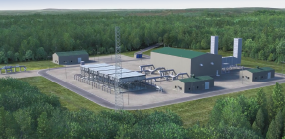Pending and/or proposed Federal and local regulations have generated increasing interest in trade-offs between emissions of NOx versus CO, THC’s and in particular HAPS. The Pipeline Research Council International (PRCI) commissioned Advanced Engine Technologies Corporation (AETC) to compile a database of engine emission and performance data for typical two and four stroke cycle lean burn reciprocating engines in gas transmission service and then characterize the trade-offs between NOx and other engine pollutant emissions in addition to engine performance (Reference 7).
The results confirmed the existence of decaying exponential trade-off’s between NOx emissions and other carbon pollutant emissions (THC, CO and HAPS) and engine performance (Brake Specific Fuel Consumption and combustion instability). The method of ignition system dictated the location of the trade-off knee while the mixing effectiveness seemed to determine the "base-line" emissions level.
Since completion of the original "trade-off" study, three companies serving the natural gas industry have developed technologies for enhancing performance of typical pipeline engines via enhanced mixing and flame propagation. These Enhanced Mixing Combustion Technologies (EMCT) are very cost-competitive and offer a number of benefits in BSFC and component loading. Using the same methodology as the prior PRCI study, this report assesses the trade-off characteristics of these technologies and compares them with more conventional emissions remediation methods.
The results indicate EMCT beneficially shifts the NOx trade-off knee and/or eliminates the trade-off altogether, allowing operation at substantially reduced NOx levels without the normal penalty in other emissions or engine performance. For example, EMCT favorably shifts the trade-off knee by about 3 g/BHP-HR NOx for both H2CO and THC while CO and Break Specific Fuel Consumption becomes invariant.
In addition, EMCT improves baseline combustion stability by almost a factor if 2, extending operation down to ~3 g/BHP-HR NOx without any significant penalty. Open combustion chamber engines fitted with EMCT can initiate and propagate a flame under much leaner conditions than the same engine fitted with conventional fuel valves. This reduces sensitivity to lean cylinder unbalance and improves combustion stability substantially reducing the minimum achievable NOx emissions for a given engine while extending the operable range. The addition of automatic balancing, often included with EMCT retrofits should further extend and sharpen the trade-off knee. In summary, EMCT offers a significant improvement in trade-off performance over other emission remediation technologies.



